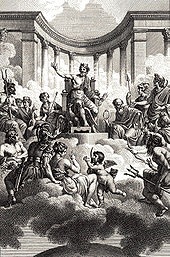|
|
| |
|
|
| |
|
|
|
|
| |
 |
| The Greek gods of
Olympus, after whom the Solar System's Roman
names of the planets are derived. |
Planets
A planet is a large object such as Jupiter or Earth that
orbits a star. It is smaller than a star, and it does
not make light.
Planets are shaped like a slightly squashed ball (a
spheroid). Objects that orbit planets are called
satellites. A star and everything which orbits it are
called a star system.
There are eight planets in our Solar System. Pluto used
to be called a planet, but in August 2006, the
International Astronomical Union decided it was a dwarf
planet instead. There are four more known dwarf planets
in the Solar System, Ceres, Makemake, Eris and Haumea.
The name "planet" is from the Greek word πλανήτης (planetes),
meaning "wanderers", or "things that move". Until the
1990s, people only knew of those in the Solar System. As
of June 2011, we know of 563 other planets. All of these
newly found planets are orbiting other stars: they are
extrasolar planets. Sometimes people call them "exoplanets". |
|
In the Solar System
The planets in the Solar System have names of Greek or
Roman gods, apart from Earth, because people did not
think Earth was a planet in old times. However, Earth is
occasionally referred by the name of a Roman god: Terra.
Other languages, for example Chinese, use different
names. Moons also have names of gods and people from
classical mythology, or from the plays written by
Shakespeare. |
|
Planets
Here is a list of planets in the Solar System. They are
ordered by how close they are to the Sun, nearest first. |
- Mercury
- Venus
- Earth
- Mars
- Jupiter
- Saturn
- Uranus
- Neptune
|
|
Types of planets
Astronomers speak about major (or true) planets, and
minor planets, which are smaller objects that go around
the Sun. Some examples of "minor planets" are asteroids,
comets, and trans-Neptunian objects.
Planets in the Solar System are of three types: |
- Terrestrial
or rocky: Planets that are similar to Earth — in
them is mostly rock: Mercury, Venus, Earth, Mars.
- Jovian or gas
giant: These planets are mostly made of gas:
Jupiter, Saturn, Uranus, Neptune. Uranian planets are a
special sort of gas giants, they have more hydrogen and
helium.
- Icy:
Sometimes people also have a third sort, for bodies such
as Pluto (though Pluto is no longer called a planet by
everyone). These planets are mostly made of ice.
|
|
Many objects in the Solar System that are not planets are
also "icy". Examples are the icy moons of the outer planets
of the Solar System (like Triton). |
|
|
|
|
|
|
|
|
|
|
|
|
|
|
|
|
|
|
Search Fun Easy English |
|
|
|
|
|
|
|
|
|
|
|
|
|
|
|
About
Contact
Copyright
Resources
Site Map |